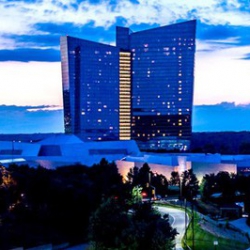
The tribes have accused US Interior Department’s Ryan Zinke of delaying the East Windsor casino after taking a meeting with MGM Resorts’ lobbyists.
The Mohegan and Mashantucket Pequot tribes announced they would not participate in a bidding process for a Bridgeport casino, putting Connecticut lawmakers in a potential bind. The Connecticut State Legislature has discussed a plan to open bidding to tribal and commercial casino companies for a Bridgeport license.
On Friday, the Connecticut General Assembly’s Public Safety and Security Committee approved a casino licensing process for a Bridgeport casino license. The bill now goes to the General Assembly for a floor vote.
Earlier in the week, Attorney General George Jepsen ruled that the license would not break the state’s gaming compact with the tribes. Rodney Butler, Mashantucket Pequot Tribal Council president, disagreed.
Butler said Jepsen’s ruling was akin to him telling his wife of 23 years he was going on a singles cruise. Rodney Butler spoke of the new bill when he said, “As it’s been drafted, we just can’t support it.”
Mohegan Sun and Foxwoods Position
The two tribes, which respectively own the Mohegan Sun and Foxwoods casinos in southeastern Connecticut, said they had no desire to compete against outside casino developers. The Native American tribes have a casino gaming monopoly in the state, so involving themselves in the Bridgeport casino bidding process would be abdicating their monopoly rights.
MGM Resorts, a Las Vegas casino company with developers in several US states and in Macau, mounted a legal challenge to gain the right to build a casino in Bridgeport, a city in southwestern Connecticut which would draw many customers from New York City. In fact, the Bridgeport casino would build a firewall between New York City and the tribes’ casinos across the state.
$700 Million Bridgeport Casino
Under the MGM Resorts plan, they would invest $700 million in a Bridgeport seaside casino-resort. The company would build a dealer training facility in New Haven. In all, MGM Resorts’ plan would provide 7,000 new jobs to Connecticut residents.
The plan also would fill the coffers of the Connecticut Treasury Department. A casino in the southeastern part of the state long has been considered a lucrative option. In 2016, MGM Resorts brought a lawsuit claiming that their Bridgeport plan was rejected by Connecticut officials, which MGM lawyers claimed was unconstitutional. The case was thrown out of court, but it got some Connecticut lawmakers to considering the benefits of a full casino licensing process like what happened in Massachusetts and New York State in recent years.
By its very nature, a competitive process is going to produce bigger bids and better jobs. Yet the Mashantucket Pequot and Mohegan tribes claim the process would be illegal, due to their gaming compacts with Connecticut.
1988 Indian Gaming Regulatory Act
Under the 1988 Indian Gaming Regulatory Act, tribes can open casinos on reservation lands, but only if they have a gaming compact with the state in which they are located. The state can collect tax revenues, but only for the amount it takes to oversee the fairness of tribal gaming. If the state agrees to provide special concessions to tribal gaming operators — like a monopoly over gaming in the state — then a state like Connecticut can negotiate higher tax rates.
That framework has worked for a generation between Connecticut and the two tribes. But those deals were under a different gaming environment, when few US states had tribal gaming or commercial gaming. In the past 10 to 15 years, the market has fragmented.
Casino Market Saturation
As more states began to look for revenues that did not involve income taxes, property taxes, or sales taxes, the casino gambling option became attractive. With lottery gambling’s expansion, as well as online and mobile gambling in people’s homes, the US population became more amenable to having casinos in their states. Nearby states like New York, Pennsylvania, Massachusetts, and Rhode Island opened land-based casinos or approved casino-style betting in racetracks. Few customers from those states visited Mohegan Sun and Foxwoods. Keeping Connecticut residents going to the tribal casino became more important.
MGM Resorts presents a special problem for Connecticut’s lawmakers and tribal gaming operators. The company is building a $900 million casino-resort in Springfield, Massachusetts — only 30 miles from Hartford, Connecticut. To build a firewall against Hartford-area gamblers from going out of state, the Connecticut legislature approved a satellite casino license in East Windsor, a suburb of Hartford. Trouble gaining licensing from the US Department of the Interior’s Ryan Zinke also caused delays in the East Windsor project.
Connecticut Gaming Compact
That license went to the Foxwoods and Mohegan Sun tribes, who will own the East Windsor casino in a joint venture. Many believed the MGM Resorts lawsuit involving Bridgeport was a stalling tactic to delay building of the East Windsor casino. But once the casino license was approved, residents in other Hartford suburbs began to lobby for a more open process.
So did residents in Bridgeport, which is the real reason Connecticut lawmakers have begun to give the prospect serious consideration. The tribes’ refusal to join in the Bridgeport licensing process could present those lawmakers with a dilemma, though. If a licensing process goes forward, officials might have to decide whether to give MGM Resorts (or another commercial operator) a license or not. If they do, they get big new revenues, but risk having their gaming compact torn up. If the monopoly is broken, Mohegan Sun and Foxwoods would not have to pay taxes to the State of Connecticut.
State Sen. Michael McLachlan (R-Danbury) who chairs the joint Senate/Assembly panel, the Government Administration and Elections Committee, said of that prospect, “It’s frankly a scary thought that that could be in jeopardy.” He added, “My second concern is that there has been a long-standing agreement that some believe is in peril.”
